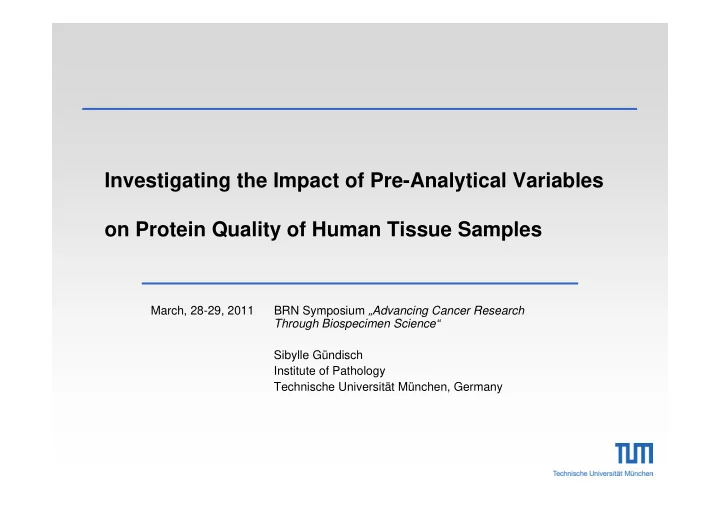

Investigating the Impact of Pre-Analytical Variables on Protein Quality of Human Tissue Samples March, 28-29, 2011 BRN Symposium „Advancing Cancer Research Through Biospecimen Science“ Sibylle Gündisch Institute of Pathology Technische Universität München, Germany
Pre-Analytical Variables Patient information medication, anesthesia Fixation/Storage Molecular Biopsy analysis Surgical resection Time Fixation Times of Storage - type of fixative - vessel ligation - duration - fixation time - specimen removal - temperature - transport to pathology (temperature) Molecules might change during pre-analytical phase High quality tissue Basic prerequisite for biomedical research – specimen
Experimental setting Protein extraction Tissue collection: 1-D-SDS-PAGE by homogenisation Liver, cryo material No. #1 No. #2 No. #3 (protease, phosphatase, kinase inhibitors) T180 T360 T30 T60 T0 size: 100-250 kDa cold ischemia Tandem Mass Spectrometry LC-MS/MS Validation Reverse phase Immuno- protein microarray Western blot histochemistry Data analysis/ Identification of proteins
Results • Pilot study: • Extended study: • 1 patient sample ( T0, T360 ) • 4 patient samples (biological replicates; T0, T30, T180, T360 ) • 290 identified proteins • 584 identified proteins � 63 proteins significantly � T0 � T360: 9 proteins significantly downregulated/degraded (21,7%) downregulated/degraded (1,5%) � 110 proteins significantly upregulated � T0 � T360: 21 proteins significantly (37,9%) upregulated (3,6%) percentage of significantly differently expressed/regulated proteins in the extended study very small compared to the pilot study due to patient-to-patient variabilities no global trend detectable towards up- or downregulation or degradation
Results Mass Spectrometry Validation by RPPA analysis LC-MS/MS result of GAPDH: RPPA result of GAPDH: Samples were provided by the Institute of Pathology, Medical University of Graz, Austria
Results Mass Spectrometry Validation by RPPA analysis LC-MS/MS result of protein X: RPPA result of protein X: Samples were provided by the Institute of Pathology, Medical University of Graz, Austria
Validation by RPPA analysis in Representative RPPA and Western blot result n=15 patient samples Patient sample No.2 Total number of samples = 75 X X Protein X is significantly upregulated after 360 min Samples were provided by the Institute of Pathology, Medical University of Graz, Austria and the Department of Pathology, Josephine Nefkens Institute, Erasmus Medical Center Rotterdam, The Netherlands
Conclusions & Outlook • Proteome may be more stable than expected during first 60 min of ischemia • Only a few proteins were found to be significantly up- or downregulated/degraded • Data suggest that cold ischemia time up to 60 min has no major impact on tissue quality with regard to proteins • Results have to be verified in different tissues (non-malignant and malignant) • Comparison between different fixatives e.g. PAXgene Tissue System
Thank you for your attention! Acknowledgement Surgical department MRI: Pathology TUM: PD Dr. Yves Harder Prof. Dr. H. Höfler PD Dr. Robert Rosenberg www.spidia.eu Prof. Dr. KF Becker Dr. Uwe Oelmüller Dr. Katharina Malinowsky Dr. Daniel Grölz Christa Schott Prof. Dr. Kurt Zatloukal Claudia Wolff Dr. Christian Viertler Marina Grether Dr. Peter Riegman Core Facility Proteomics: Marcel Kap Dr. Enken Drecoll Bas De Jong Dr. Rupert Langer Dr. Stefanie Hauck Dr. Julia Slotta-Huspenina Dr. Hakan Sarioglu
Recommend
More recommend